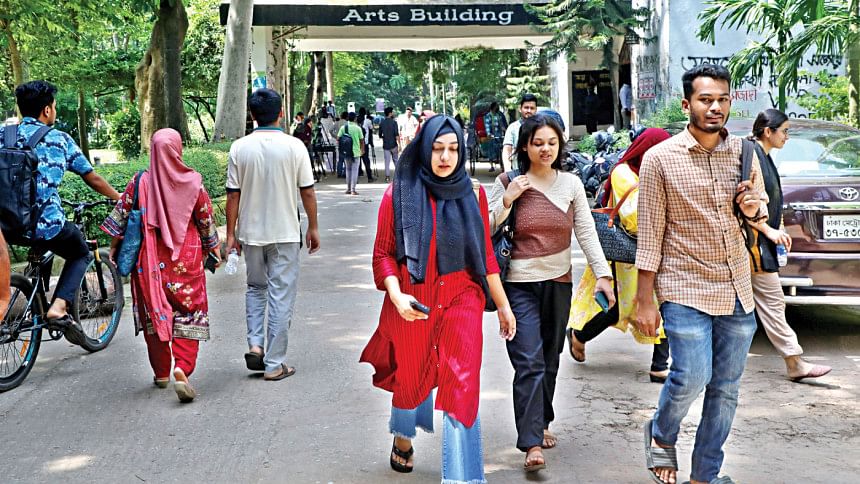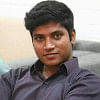DU comes back to life

The Dhaka University campus was full of energy and life yesterday as students returned to classes after over three months.
Students from every department arrived on campus early in the morning, rushing to classrooms, libraries, seminars, and cafeterias.
From the arts building to the science faculty in Curzon Hall, as well as Ducsu building, TSC, Modhur Canteen, and Mall Chattar, students filled these spaces, engaging in lively chitchats as well as serious discussions during breaks between classes.
The campus was first closed for nearly a month for summer vacation starting June 2. Although the university reopened on July 1, classes were not held because of the teachers' strike. On that same day, students initiated a quota reform movement that eventually escalated into an anti-government protest, culminating in a people's uprising that led to the fall of the Sheikh Hasina government on August 5.
The university remained closed as there were vacancies in various academic and administrative positions, including the vice-chancellor's post. Although the VC was appointed at the end of last month, it took some time for the university to prepare for the resumption of classes.
And as the classes began, the students returned with fresh expectations and confidence.
"I'm excited beyond words. It feels as though I have been reinvigorated by going back to class and reconnecting with my teachers and classmates after so long," said Sharif Uddin, a second-year student from the Sanskrit department.
"I hope this reopening marks the a new beginning for the university," he said.
Sumaiya Akter, a third-year student from meteorology department, was equally ecstatic as Sharif.
"Although the classes were a little late to start, it's good to be back. I could finally talk with my friends about the things that I kept in me for the last three months."
Many students were seen sitting in groups and chatting in the cafeteria of Ducsu building.
Noureen Akhtar, a student of the sociology department, said, "We used to hang out and have breakfast every day when we came to Ducsu. It's been a while since we last did that. I've missed that all this time."
During mass protests, many teachers and students became estranged because of various issues, affecting the teacher-student relationship.
Now the teachers and students think that it is time to put those issues aside, rebuild the relationships, and move forward.
Teachers in many departments welcomed students with flowers and gave sweets and cakes in the morning.
Talking to reporters at the arts building, Abdullah Al Mamun, professor of the Japanese studies department, said, "Students are excited to be back in their usual academic routine.
"Students have already missed many classes. The university authorities should take the initiative to avoid a session jam."
The BRTC double-decker buses for the students returned to the campus in the morning carrying non-resident students. The buses were later parked in rows at Smriti Chirantan Chattar and Curzon Hall areas, waiting to take the students to their destination after class.
Although academic activities have resumed, the first-year classes have not started yet. Freshmen will begin classes next week.
Yet, a group of freshmen were seen hanging out with their friends at the Madhur Canteen which saw a huge presence of students throughout the day.
When asked about the expectations of the university, Syed Jahed Iqbal, a first-year student, said, "Our expectation from this university is that the campus will be free of session jams and politics."
Before the start of classes at 9:30 in the morning, the university authorities observed a minute's silence in memory of the martyrs who died in the uprising. The program was held in front of Nawab Ali Chowdhury Senate Bhaban.
DU VC Prof Niaz Ahmed Khan said the decision to resume classes was taken after discussing with all the participants of the university, including teachers and students.
He said that necessary measures will be taken to make up for the learning loss.
At present DU consists of 13 faculties, 83 departments, 12 institutes, 20 residential halls, 3 hostels, and more than 56 research centres and 37,000 students.

 For all latest news, follow The Daily Star's Google News channel.
For all latest news, follow The Daily Star's Google News channel. 



Comments